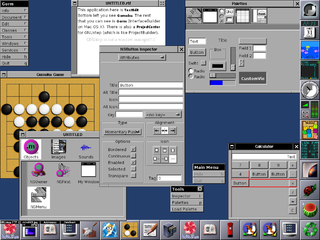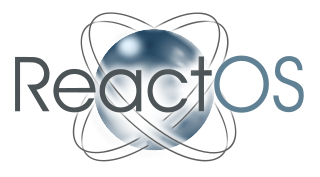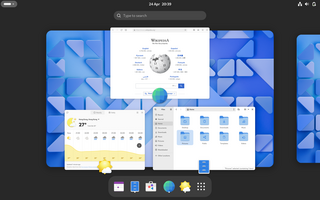See also
- X.com
- X Window System, a windowing system for bitmap displays, common on UNIX-like computer operating systems
X.org is a single-letter second-level internet domain name.
It may also refer to:

The X Window System is a windowing system for bitmap displays, common on Unix-like operating systems.

GNUstep is a free software implementation of the Cocoa Objective-C frameworks, widget toolkit, and application development tools for Unix-like operating systems and Microsoft Windows. It is part of the GNU Project.

Enlightenment, also known simply as E, is a compositing window manager for the X Window System. Since version 20, Enlightenment also supports Wayland, and is shipped with some linux distributions such as Bodhi Linux and Pentoo.

Mozilla Firefox, or simply Firefox, is a free and open-source web browser developed by the Mozilla Foundation and its subsidiary, the Mozilla Corporation. It uses the Gecko rendering engine to display web pages, which implements current and anticipated web standards. Firefox is available for Windows 10 or later versions, macOS, and Linux. Its unofficial ports are available for various Unix and Unix-like operating systems, including FreeBSD, OpenBSD, NetBSD, illumos, and Solaris Unix. It is also available for Android and iOS. However, as with all other iOS web browsers, the iOS version uses the WebKit layout engine instead of Gecko due to platform requirements. An optimized version is also available on the Amazon Fire TV as one of the two main browsers available with Amazon's Silk Browser.

ReactOS is a free and open-source operating system for i586/amd64 personal computers intended to be binary-compatible with computer programs and device drivers developed for Windows Server 2003 and later versions of Microsoft Windows. ReactOS has been noted as a potential open-source drop-in replacement for Windows and for its information on undocumented Windows APIs.
X server may refer to:
freedesktop.org (fd.o), formerly X Desktop Group (XDG), is a project to work on interoperability and shared base technology for free-software desktop environments for the X Window System (X11) and Wayland on Linux and other Unix-like operating systems. Although freedesktop.org produces specifications for interoperability, it is not a formal standards body.

The X.Org Foundation is a non-profit corporation chartered to research, develop, support, organize, administrate, standardize, promote, and defend a free and open accelerated graphics stack. This includes, but is not limited to, the following projects: DRM, Mesa 3D, Wayland, and the X Window System and its primary implementation, the X.Org Server.
X.Org Server is the free and open-source implementation of the X Window System (X11) display server stewarded by the X.Org Foundation.
GLX is an extension to the X Window System core protocol providing an interface between OpenGL and the X Window System as well as extensions to OpenGL itself. It enables programs wishing to use OpenGL to do so within a window provided by the X Window System. GLX distinguishes two "states": indirect state and direct state.
In computing, the X Window System is a network-transparent windowing system for bitmap displays. This article details the protocols and technical structure of X11.
Windows Presentation Foundation (WPF) is a free and open-source user interface framework for Windows-based desktop applications. WPF applications are based in .NET, and are primarily developed using C# and XAML.
Awesome may refer to:
In computing, a keyboard shortcut is a sequence or combination of keystrokes on a computer keyboard which invokes commands in software.

Linux is a family of open-source Unix-like operating systems based on the Linux kernel, an operating system kernel first released on September 17, 1991, by Linus Torvalds. Linux is typically packaged as a Linux distribution (distro), which includes the kernel and supporting system software and libraries, many of which are provided by the GNU Project. Many Linux distributions use the word "Linux" in their name, but the Free Software Foundation uses and recommends the name "GNU/Linux" to emphasize the use and importance of GNU software in many distributions, causing some controversy.
Comparison of the Java and .NET platforms.
Free Software Foundation anti-Windows campaigns are the events targeted against a line of Microsoft Windows operating systems. They are paralleling the Defective by Design campaign against digital rights management technologies, but they instead target Microsoft's operating systems instead of DRM itself.
A mobile operating system is an operating system used for smartphones, tablets, smartwatches, smartglasses, or other non-laptop personal mobile computing devices. While computers such as typical/mobile laptops are "mobile", the operating systems used on them are generally not considered mobile, as they were originally designed for desktop computers that historically did not have or need specific mobile features. This line distinguishing mobile and other forms has become blurred in recent years, due to the fact that newer devices have become smaller and more mobile unlike hardware of the past. Key notabilities blurring this line are the introduction of tablet computers, light laptops, and the hybridization of the two in 2-in-1 PCs.

GNOME, originally an acronym for GNU Network Object Model Environment, is a free and open-source desktop environment for Linux and other Unix-like operating systems.
Microsoft, a technology company historically known for its opposition to the open source software paradigm, turned to embrace the approach in the 2010s. From the 1970s through 2000s under CEOs Bill Gates and Steve Ballmer, Microsoft viewed the community creation and sharing of communal code, later to be known as free and open source software, as a threat to its business, and both executives spoke negatively against it. In the 2010s, as the industry turned towards cloud, embedded, and mobile computing—technologies powered by open source advances—CEO Satya Nadella led Microsoft towards open source adoption although Microsoft's traditional Windows business continued to grow throughout this period generating revenues of 26.8 billion in the third quarter of 2018, while Microsoft's Azure cloud revenues nearly doubled.